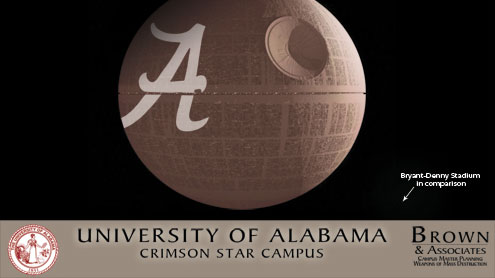In his first initiative as chancellor of the University of Alabama system, Robert Witt has proposed the creation of a moon-like, weaponized space station that will also serve as the fourth UA campus.
The project, codenamed the “Crimson Star,” would be the first of its kind in higher learning. Measuring 160 kilometers in diameter, the technological marvel would be in geosynchronous orbit above Tuscaloosa at all times, just beyond Earth’s atmosphere.
“I recognize the concerns students at the University of Alabama have had with the flourishing of our student population,” Witt said. “We found the Tuscaloosa campus’s lack of space disturbing, so we thought now would be a good time to put many students in outer space.”
In a clever bit of legal maneuvering, the Crimson Star has been enrolled as a part-time student, meaning precise details about the financial costs of the project are protected by federal privacy laws. However, Witt confirmed that funding the revolutionary project would not affect the student experience at the Tuscaloosa campus.
“Obviously we’ll get most of the cash from UAB and UAH,” Witt said. “And Coach Saban, who is actually a huge space enthusiast, has agreed to donate a portion of his salary over the next eight seasons to the Crimson Star project. So to all the naysayers who complained about his recent raise, I guess now I’d agree that his salary is astronomical.”
In exchange for Saban’s funding, the space station will feature an athletic facility where Tide players can practice in a zero-gravity environment.
“I think throwing a pass that travels thousands of miles into deep space will really help my mental game,” starting quarterback AJ McCarron said.
In addition to the athletic field, there is already a section of the station partitioned for fraternities and sororities. The area, tentatively dubbed “Galactic Row,” will maintain the tradition of large, lavish mansions for wealthy white college students, only in space.
“With this new campus, our greek life will continue to develop. Yes, I think our fraternity and sorority members will enjoy living in this … machine,” Witt said, tapping his fingers together lightly.
With UA students becoming some of the first humans in history to live away from Earth for an extended period, the discovery of alien life is something future students and administrators may have to deal with. Witt said he’d be happy to take any extraterrestrial’s tuition dollars.
However, he would not go so far as to say they’d be welcome on Galactic Row. When asked several questions about the importance of species diversity in a theoretical greek system where different types of life forms might want to intermingle, he said those groups were free to determine their own membership.
“I think it’s better for us to focus on the current issues,” Witt said. “One exciting element of this move is that with four campuses, the University of Alabama system will now qualify for ‘empire’ status from the federal government.”
With this new designation, the UA empire will be able to operate autonomously from the state government. Witt’s title will also be changed from chancellor to emperor.
Witt declined to comment on the superlaser to be mounted on the Crimson Star’s frame to the right of what will be the largest script “A” insignia in the galaxy. However, an official in the facilities and grounds department confirmed that the device would be used to target students, faculty and staff whose thoughts, words or actions did not fall in line with the goals of the UA empire.
A rendering of the superlaser obtained by The Crimson White included the words “Order 66” in handwritten pen. The Crimson White has yet to determine the cryptic phrase’s meaning.
When asked whether the incomprehensibly powerful weapon would ever be used to quell the First Amendment rights of student media, Witt looked upon the schematics of his Crimson Star, tapped his fingers together lightly and smiled.









